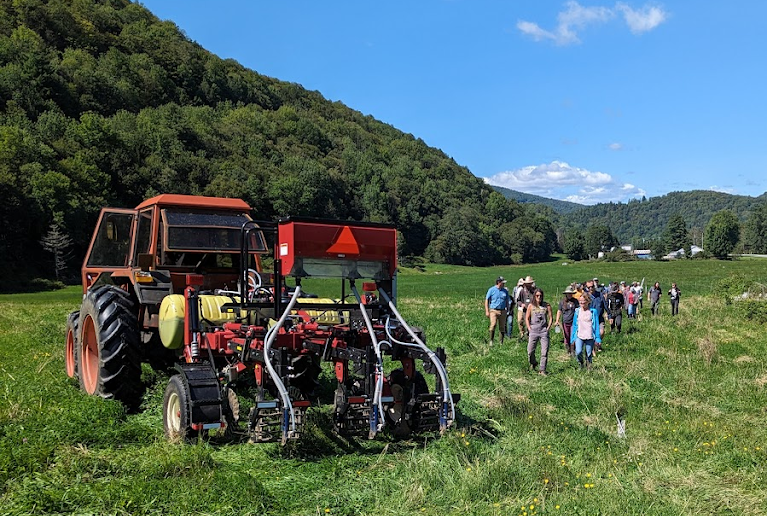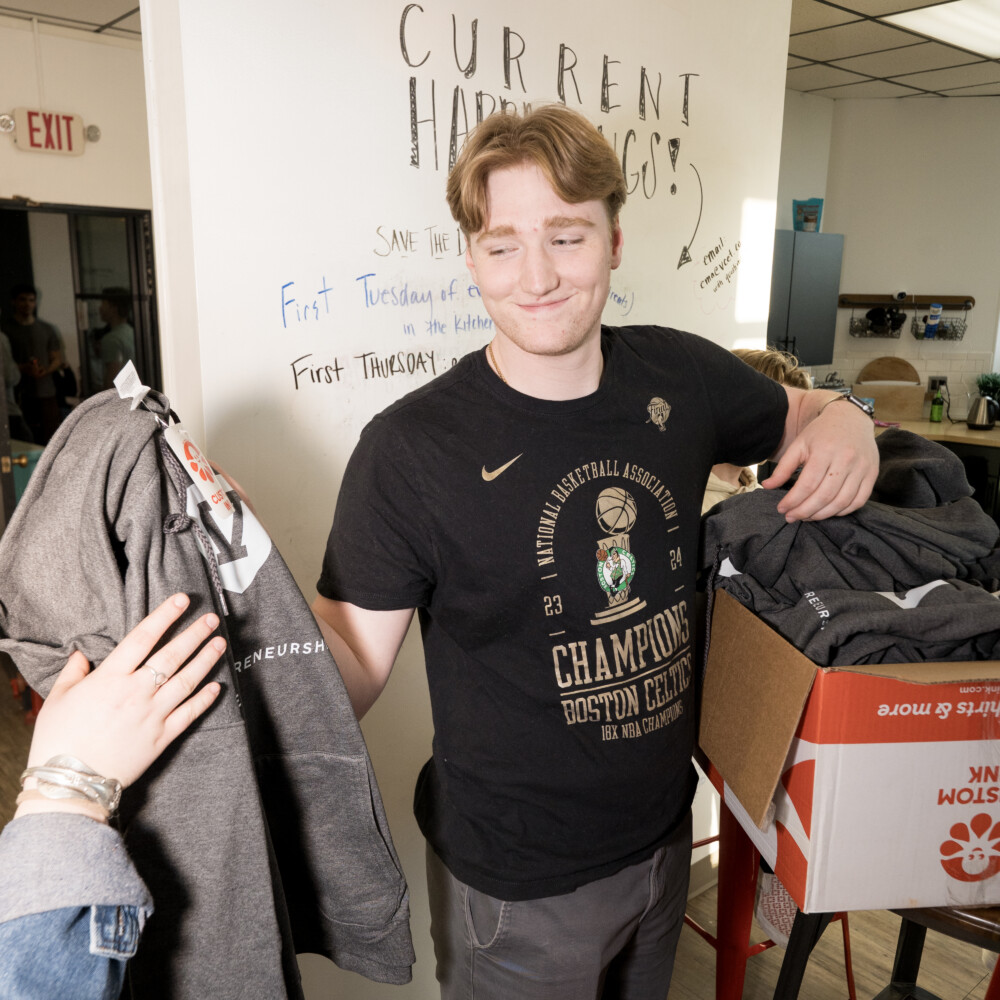Lisa Groeneveld / Board Member Spotlight
Lisa Groeneveld co-founded OnLogic with her husband, Roland, in 2003. Headquartered in South Burlington, OnLogic designs and manufactures industrial computers. In this conversation, Lisa reflects on her entrepreneurial journey, the challenges and rewards of building a global company in Vermont, and her experience on the VCET board.
Blaise: Lisa! You grew up in Barre, Vermont, to parents who owned The Cobbler’s Shoppe in Montpelier. What was it like to grow up with entrepreneurial parents?
Lisa: Well, I can honestly say I never expected to own a business, because with my parents, it was obvious how difficult it was. Since they owned a retail store, my father worked every holiday: Thanksgiving, the day after Thanksgiving, Christmas Eve, and the day after Christmas. So one of the things that was important to me in starting a business was that we would always give our staff certain days off, like the day after Thanksgiving. That was a firm rule, and that’s still the case at OnLogic.
Blaise: You and Roland founded OnLogic in a one-bedroom apartment in Boston in 2003. What inspired you to take the leap and start a business together?
Lisa: I have a high risk tolerance. And there came a day when Roland said to me, after he had just emigrated from the Netherlands, ‘I don’t know if I want to start over again and tidy up my resume. I think we can import these motherboards from Asia and sell them online.’ And I said, ‘That sounds like an awesome idea.’ It never occurred to me for an instant how hard it was going to be, even despite what I witnessed with my parents. It just seemed like a good idea at the time.
Blaise: OnLogic designs and develops industrial computers. You’ve described yourselves as innovators, not inventors. What do you mean by that?
Lisa: When I say we’re innovative, I don’t just mean technologically innovative, I mean innovative in our business model. Our goal was to take something that we know is useful and make it work better. And that’s what we did: When we entered the market 21 years ago, we looked at the way things were being done and said, ‘Oh, we can do that so much better.’ In order to buy computers from our competition, you had to call them, and they didn’t always call you back if they didn’t think you were an important enough company. We were like, ‘The heck with that. We’re going to be innovative. We’re going to put everything on the internet – our prices, a ton of technical information – and we’re going to let our customers figure it out before they have to call us.’ And then when they call us, we’re definitely picking up the phone.
Blaise: Could you elaborate more on OnLogic’s industrial computers – what makes them special? What sort of verticals do you sell in?
Lisa: Our computer is just like any other computer if you stuck a keyboard, monitor, and mouse on it. It would work on your desk as your desktop. But it’s rugged, so it’s significantly more expensive than what you might buy from Best Buy. It withstands wide temperatures and high vibration environments. Our computers are fit for the environment that they’re in and cost thousands of dollars. Some of the more common verticals are warehouses, factories, and outdoor places with wide temperature ranges.
Blaise: OnLogic recently opened a 150,000-square-foot headquarters in South Burlington. You could have chosen anywhere for this expansion – why did you decide to keep the company in Vermont?
Lisa: Over the years, Vermont has been a fantastic place to do business. We started the business in 2003 in Massachusetts and we moved it up to Vermont in 2004. The support we’ve gotten from the state has been outstanding. We felt like we’ve been doing this in Vermont, we’ve been fairly successful, so let’s keep going. But I sometimes ask myself that same question. The housing crisis snuck up on us. Considering the lack of housing now, and what’s really obvious to us now, I’m not sure we would have stayed in Vermont. That’s the big problem right now.
Blaise: As you continue to grow, what’s next for OnLogic? Are there any major developments or goals on the horizon?
Lisa: These past couple of years have been pretty tough in our industry. Companies like Intel and Dell are laying off. Amazon is implementing a return to office plan. It has been an interesting time in technology and IT. But we’re feeling extremely confident as we go into this new year that our customers are starting to come back and grow again themselves. Where we are right now in the United States and also increasingly in Europe, we are considered probably the premier resource for industrial computers. And it’s not a small market. Our competitors are not small businesses: they’re multi-billion dollar businesses, companies you’ve heard of, like Lenovo and Dell. This company in little Vermont is competing on a global stage. And we have the infrastructure – not just the physical infrastructure, but the human infrastructure – to really continue to grow. I think the sky’s the limit.
Blaise: Vermont State Senator Thomas Chittenden has said you inspire students by showing them how high-tech, global careers can start here in Vermont. How important is it to you to engage with the next generation of Vermonters, and what initiatives have you been involved in to support this?
Lisa: We are deeply involved in the local colleges: St. Mike’s, Champlain, UVM. Our feeling, our hope, is that if students are already in Vermont, they have some housing. And a lot of students who choose to come to Vermont, they love it, and they want to stay. We pay very good wages to students in Vermont that want to work for us full time. And we give them as many opportunities to continue to grow their career with us as possible. I believe UVM is thinking about setting up a co-op program, which would be amazing, and we will be all over that. I went to Northeastern, and I got through college because of the co-op program there.
Blaise: What advice would you offer to someone in Vermont who’s considering starting their own business?
Lisa: The concept that culture eats strategy for breakfast is so true. As you start your business, be extremely mindful of your behaviors and your culture. If you have the benefit of starting your business with one or two co-founders, have a seat, spend a quiet Saturday talking about who you are and who you are not, and do not stray from that. People won’t get behind a strategy unless they believe in the founders.
Blaise: How were you first introduced to VCET? And why did you join the board?
Lisa: I sign up for people. And VCET has been an amazing resource to the Vermont business community – not just a financial resource, but also an emotional support resource. When you’re starting a business, you feel very alone. [VCET] makes people feel less alone in their challenges by saying things like, ‘Yeah, you’re not the only one going through this. Here, pop in and we’ll have a cup of coffee.’
Blaise: What does an ideal day in Vermont look like for you?
Lisa: I love spending time with friends, skiing, and hiking.
This interview has been lightly edited for brevity and clarity.
You can follow Lisa on LinkedIn here. For more on OnLogic, click here.



